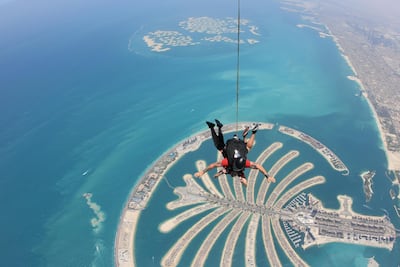Skydiving. Can someone explain, please? Why would anyone in their right mind willingly jump out of a plane and then take joy in plummeting about 4,000 metres to the ground at more than 190 kilometres an hour? Why does anyone pay good money to feel like they are dicing with death?
I have long been perplexed by this extreme sport. It’s not that I am averse to a bit of adventure. I have climbed Kilimanjaro, been on surfing holidays, done walking safaris and travelled, all on my own, to some less-than-savoury spots. But the number one aim, on all of these occasions, has been to keep myself as safe as possible. There’s always been a backup plan and exit strategy. Perhaps that’s my issue with skydiving. There’s no backup plan. No exit strategy.

My general consensus is that there are already plenty of ways to die. So why would you actively go out seeking new ones? I feel like our most fundamental instinct as human beings is survival – which doesn’t align with throwing yourself into thin air and then trying your luck against the forces of gravity. Have people not heard of Icarus?
Apparently not, as Skydive Dubai has announced it has started offering tandem skydives to children between the ages of 12 and 17. Expect a flood of those floating-above-the-Palm selfies to hit teen Instagram accounts any day. Children will need to bring along a photo ID and meet the centre’s weight restrictions: 90kg and under for females, and 100kg or under for males. They will also need written consent from their parents or a guardian – a signed Parent Consent Tandem Waiver – before they can head up into the clouds. I can only imagine the arguments this is currently causing in households across the UAE.
All of the parents I have spoken to are horrified at the idea of letting their children loose in the skies. The general concern is not safety (even I recognise that, with a slick operation like Skydive Dubai, the chances of things going wrong are extremely limited). The question is: with children, how can you ever really know if they are ready to experience something as extreme as this? They may think it sounds like the coolest thing in the world, and all their friends might be doing it, but it is almost impossible to gauge ahead of time how they will react when push comes to shove (pun kind of intended). And once you start, there's no going back. No exit strategy. I imagine that the whole process is scary enough for adults; could it not be incredibly traumatic for some kids?
Not according to one 12-year-old who gave it a go last weekend. “It was really amazing,” she said after her jump. “I’ve watched so many skydiving videos and thought it was cool. Doing it myself was even better than I imagined. I can’t wait to do it again.”
In a statement, a representative from Skydive Dubai’s management team said: “Many dropzones around the world offer kids the opportunity to skydive, and it can do amazing things for a child’s confidence and self-belief, and open their minds to the fact that anything is possible from a young age.”
There are studies that back this up. While it doesn't specifically refer to children, research published in Psychology of Consciousness: Theory, Research and Practice by professors Eric Brymer and Robert Schweitzer maintains that extreme sports such as skydiving can have life-changing effects. It also refutes my preconceptions that people who skydive are risk-taking, devil-may-care adrenalin junkies.
"Our research has shown people who engage in extreme sports are anything but irresponsible risk-takers with a death wish," says Brymer. "They are highly trained individuals with a deep knowledge of themselves, the activity and the environment who do it to have an experience that is life enhancing and life changing.
“The experience is very hard to describe in the same way that love is hard to describe,” he explains. “It makes the participant feel very alive, where all senses seem to be working better than in everyday life, as if the participant is transcending everyday ways of being and glimpsing their own potential.”
Schweitzer adds: “Far from the traditional risk-focused assumptions, extreme sports participation facilitates more positive psychological experiences and expresses human values such as humility, harmony, creativity, spirituality and a vital sense of self that enriches everyday life.”
So maybe, just maybe, I am missing out on a whole lot of life-changing psychological enlightenment because I’m a scaredy-cat. But that’s OK. There are worse things than being too grounded.


